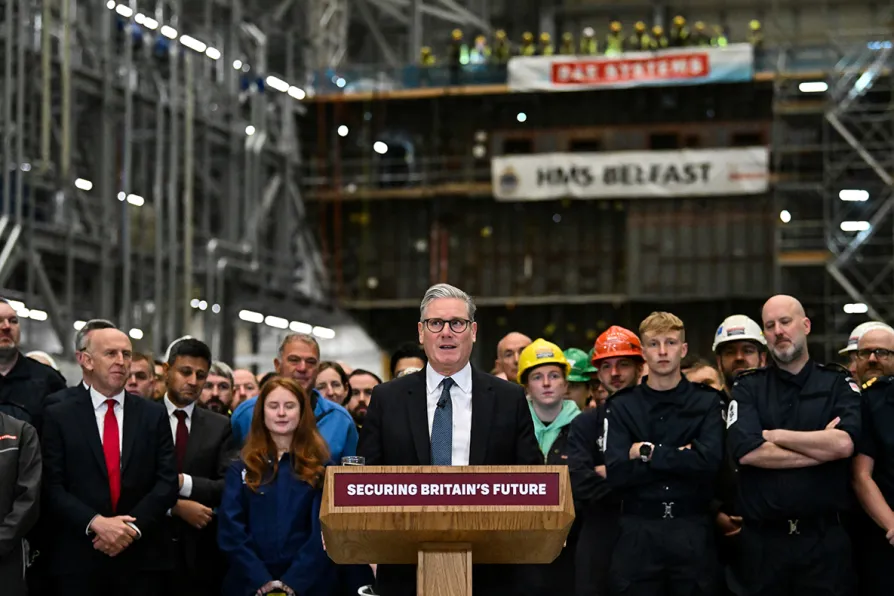Anti-war campaigners warn Britain is on course to become more militaristic as Starmer unveils massive programme of new arms spending

 Prime Minister Sir Keir Starmer speaks during a visit to BAE Systems in Govan, Glasgow, to launch the Strategic Defence Review, June 2, 2025
Prime Minister Sir Keir Starmer speaks during a visit to BAE Systems in Govan, Glasgow, to launch the Strategic Defence Review, June 2, 2025
BRITAIN is on course to become a militaristic society with a war economy as Prime Minister Sir Keir Starmer unveiled his government’s strategic defence review today.
Sir Keir pledged that Britain is becoming a “battle-ready, armour-clad nation with the strongest alliances and the most advanced capabilities, equipped for the decades to come.”
And he unveiled a massive programme of new arms spending, setting the military budget to soar to 3 per cent of GDP over the next 10 years.
Under the terms of the review, Labour aims to build at least six fresh arms factories across the country and deliver up to 12 new attack submarines as part of the AUKUS military pact with Australia and the United States.
A huge £15 billion is to be invested in nuclear weaponry, alongside a “hybrid” Royal Navy equipped with drones and aircraft as well as submarines.
Arms monopolies shares soared on the news of the spending boost, which will come at the expense of welfare and overseas aid, with tax rises also possible.
Equally chilling was Sir Keir’s claim that society must be put on a war footing. “Every part of society, every citizen of this country has a role to play,” he said.
“We have to recognise that things have changed. In the world of today the front line is here.
“The threat we now face is more serious, more immediate and more unpredictable than at any time since the cold war,” he claimed, with Russia looming largest in his demonology.
Sir Keir stressed that Britain was prepared for conflict. “We are moving to war-fighting readiness as the central purpose of our armed forces,” he said, with Nato the central commitment.
His plans were rejected by veteran left Labour MP Diane Abbott, who said: “It is not true that more military spending will boost the economy.
“It is a terrible waste when public services and our basic infrastructure need funds. It is a scandal when welfare is being cut.”
And former Labour leader Jeremy Corbyn argued: “If the government cared about people’s security, it would reverse cruel cuts, end child poverty and pursue an agenda for peace. Let’s fund welfare, not warfare.”
Stop the War Coalition vice-chair Chris Nineham said: “Increasing defence spending to up to 3 per cent of GDP, procuring more and more weapons of war and all the while slashing welfare, is simply grotesque.”
He insisted that Russia posed no plausible threat “to Warsaw or Berlin, let alone London,” adding: “The claim that building more munitions factories and submarines will help British jobs should fool no-one.
“Any big increase in spending, such as on housing and health, would have a more beneficial impact on the economy and create more jobs.
“The only beneficiaries of this defence review will be the warmongers and the arms companies. They want wars to continue.
“We urge everyone who is able to join the welfare not warfare bloc at Saturday’s People’s Assembly national demonstration to send a clear message to the government that this drive to war is not in our name.”
CND general secretary Sophie Bolt said the government seems “intent on worsening the crises” the world faces.
“Increasing nuclear threats does not make us safer and drives climate chaos,” she said.
“It channels hundreds of billions of public funds into arms companies and their shareholders’ pockets, while populations living in places like Barrow that make these nuclear weapons continue to live in poverty and deprivation.
“It is absolutely urgent that voices calling for a halt to this reckless war drive are heard.”
Green MP Ellie Chowns insisted that there are “many more jobs to be created in the clean, green — and peaceful — economy” and suggested the government focused investment there instead of increased defence expenditure.
Unite the union, however, welcomed the arms spending increases and complained only that they should be implemented faster, as did Reform, the Tories and the Liberal Democrats today.
General secretary Sharon Graham said: “Given the global challenges we face it is right that defence spending is increasing.
“Investment in the UK defence industry also creates jobs, boosts pay, increases tax income and helps drive the growth we desperately need.
“New British-built submarines will be a great start, but the government also urgently needs to commit to orders for new UK built Typhoons and medium lift helicopters.
“Defence spending on UK manufacturing needs to be increased more quickly. Countries that want to do us harm won’t wait and nor can the UK.”










